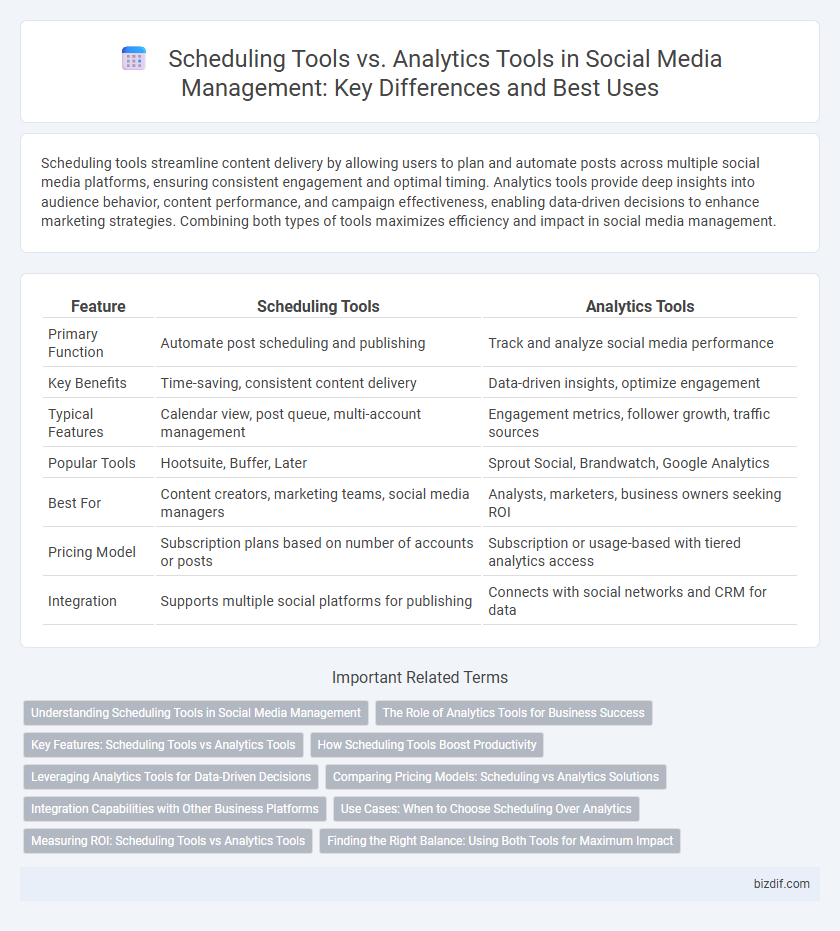Scheduling tools streamline content delivery by allowing users to plan and automate posts across multiple social media platforms, ensuring consistent engagement and optimal timing. Analytics tools provide deep insights into audience behavior, content performance, and campaign effectiveness, enabling data-driven decisions to enhance marketing strategies. Combining both types of tools maximizes efficiency and impact in social media management.
Table of Comparison
| Feature | Scheduling Tools | Analytics Tools |
|---|---|---|
| Primary Function | Automate post scheduling and publishing | Track and analyze social media performance |
| Key Benefits | Time-saving, consistent content delivery | Data-driven insights, optimize engagement |
| Typical Features | Calendar view, post queue, multi-account management | Engagement metrics, follower growth, traffic sources |
| Popular Tools | Hootsuite, Buffer, Later | Sprout Social, Brandwatch, Google Analytics |
| Best For | Content creators, marketing teams, social media managers | Analysts, marketers, business owners seeking ROI |
| Pricing Model | Subscription plans based on number of accounts or posts | Subscription or usage-based with tiered analytics access |
| Integration | Supports multiple social platforms for publishing | Connects with social networks and CRM for data |
Understanding Scheduling Tools in Social Media Management
Scheduling tools in social media management streamline content planning by enabling users to automate post publication across multiple platforms, enhancing consistency and engagement. These tools, such as Hootsuite and Buffer, offer features like calendar views and bulk uploading, which reduce manual effort and save time. By contrast, analytics tools focus on performance measurement, tracking metrics like reach, impressions, and engagement rates to refine social media strategies.
The Role of Analytics Tools for Business Success
Analytics tools provide critical insights into audience behavior, engagement patterns, and content performance, enabling data-driven decision-making that enhances social media strategies. By tracking key metrics such as conversion rates, click-through rates, and follower growth, businesses can identify successful campaigns and optimize future content for maximum impact. Effective use of analytics tools leads to improved ROI, better targeting, and sustainable business growth in competitive digital markets.
Key Features: Scheduling Tools vs Analytics Tools
Scheduling tools streamline social media campaigns by enabling automated content posting, calendar management, and multi-platform integration, which saves time and ensures consistent engagement. Analytics tools provide in-depth insights through metrics like audience demographics, engagement rates, and conversion tracking, empowering data-driven strategy adjustments. Combining these key features enhances overall social media management by balancing efficient execution with comprehensive performance evaluation.
How Scheduling Tools Boost Productivity
Scheduling tools streamline content posting by allowing users to plan and automate social media updates across multiple platforms, significantly reducing manual effort and time spent. These tools enhance productivity by enabling consistent publishing, improving audience engagement through timely posts without constant user intervention. Integration with calendars and team collaboration features further optimizes workflow, ensuring efficient management of social media campaigns.
Leveraging Analytics Tools for Data-Driven Decisions
Leveraging analytics tools in social media management enables precise tracking of audience engagement, content performance, and campaign ROI, providing actionable insights for data-driven decision-making. These tools analyze metrics such as click-through rates, follower growth, and conversion rates to optimize future strategies and enhance overall effectiveness. Unlike scheduling tools that automate post timing, analytics tools empower marketers to refine content based on real-time data and audience behavior patterns.
Comparing Pricing Models: Scheduling vs Analytics Solutions
Scheduling tools typically offer tiered subscription plans based on the number of social profiles and posts per month, with prices ranging from $10 to $50 monthly. Analytics tools often adopt usage-based pricing or higher-tiered packages centered around data depth and reporting frequency, with costs spanning from $30 to $150 per month. Businesses prioritize scheduling solutions for straightforward content management budgets, while analytics platforms demand higher investment for advanced performance insights.
Integration Capabilities with Other Business Platforms
Scheduling tools streamline content publication by integrating seamlessly with business platforms like CRM and email marketing systems, ensuring timely posts align with broader campaigns. Analytics tools connect with data warehousing and BI software to provide in-depth performance insights, enabling data-driven decisions across marketing and sales teams. Integration capabilities of scheduling tools focus on automation and workflow efficiency, while analytics tools prioritize data aggregation and cross-platform reporting.
Use Cases: When to Choose Scheduling Over Analytics
Scheduling tools excel for planning and automating content posting across multiple platforms, ensuring consistent audience engagement without manual intervention. These tools are ideal when focusing on maintaining a regular publishing calendar and managing time efficiently during peak activity periods. Choose scheduling over analytics when the priority is streamlining workflow rather than in-depth performance measurement or data-driven strategy adjustments.
Measuring ROI: Scheduling Tools vs Analytics Tools
Scheduling tools streamline content posting across multiple platforms, enhancing consistency and audience engagement but offer limited insights into campaign performance or ROI measurement. Analytics tools provide in-depth data on user interactions, conversion rates, and engagement metrics, enabling precise calculation of social media ROI and informed decision-making. Effective social media management requires integrating scheduling tools with robust analytics platforms to optimize content strategy and accurately measure return on investment.
Finding the Right Balance: Using Both Tools for Maximum Impact
Scheduling tools streamline content distribution by allowing precise timing and consistent posting across multiple social media platforms, enhancing audience engagement and reach. Analytics tools provide critical insights into post-performance, audience behavior, and campaign effectiveness, enabling data-driven decisions for content optimization. Combining scheduling and analytics tools creates a powerful synergy, ensuring efficient management while continually refining strategies for maximum social media impact.
Scheduling tools vs Analytics tools Infographic

 bizdif.com
bizdif.com